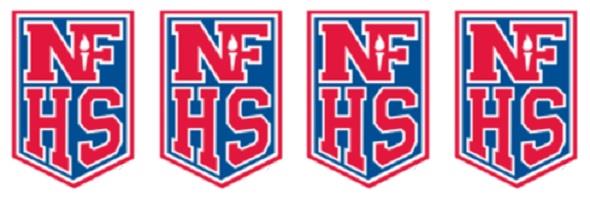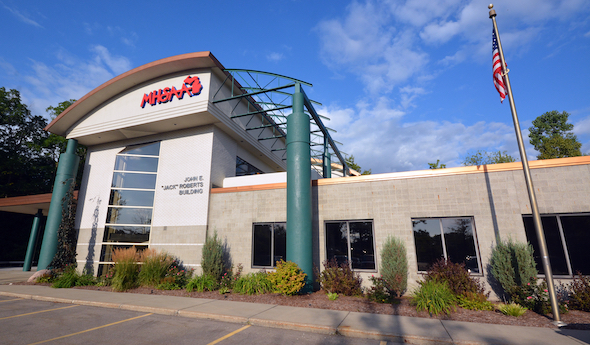
Connecticut's Niehoff to Head NFHS
April 25, 2018
Special from NFHS
Karissa Niehoff, executive director of the Connecticut Association of Schools-Connecticut Interscholastic Athletic Conference (CAS-CIAC) the past seven years, has been selected as the next executive director of the National Federation of State High School Associations (NFHS), effective Aug. 1.
Niehoff was chosen from among four finalists by the NFHS Board of Directors at meetings last week in Indianapolis. She will succeed Bob Gardner, who is retiring this summer after eight years as NFHS executive director and 48 years in secondary education, including the final 18 years on the NFHS staff in Indianapolis.
“Faced with an overwhelming response from outstanding candidates from across the nation, we are pleased to welcome the next NFHS Executive Director, Karissa Niehoff,” said Jerome Singleton, president of the NFHS Board of Directors and commissioner of the South Carolina High School League. “She displays all the qualities we were seeking and beyond. It goes without saying, Bob Gardner is a hard act to follow as he will be regaled as a world-class director, peer and true fan of high school activities and athletics.
“I speak for myself and the Board of Directors when I share that the final four candidates were more than qualified with unique leadership styles and expertise in various fields of athletics and activities. Ms. Niehoff brings a stellar background in athletic administration, team participation and large-scale leadership. She displays the characteristics of a natural leader who will forge forward only to enhance the tradition of excellence in all NFHS programs.
“I am anticipating some exciting advancements in every aspect of the NFHS which, in turn, will broaden offerings at the state and local levels for NFHS members. We thank each applicant as it was a tedious process and difficult task for all involved. Congratulations to Karissa Niehoff on her new role as Executive Director as well as the extensive accomplishments and experience she earned over her impressive career,” Singleton concluded.
Niehoff, who has directed the NFHS-member CIAC since January 2011, will be the first female to head the national leadership organization for high school athletics and performing arts activities and the sixth full-time executive director of the NFHS, which will celebrate its 100th year of service during the 2018-19 school year.
Previous full-time executive directors of the NFHS are the late H.V. Porter (1940-58) and Cliff Fagan (1958-77), along with Brice Durbin (1977-93), Bob Kanaby (1993-2010) and Gardner (2010-18).
“I am truly humbled with this opportunity – what a privilege to serve as the next executive director of the NFHS,” Niehoff said. “I am excited to work with the staff and to be able to serve the 51 member state associations – picking up on what has already been accomplished to serve as the national leader in the world of education-based athletics and activities. I believe the NFHS is on the cusp of some exciting new opportunities for students in high school athletics and activities, and I consider it an honor to have been selected to lead this organization.”
Niehoff was named deputy executive director of CAS-CIAC in July 2010 and assumed the executive director’s position the following January. She began her career in Connecticut public education in 1989 as a physical education instructor at Greenwich High School. In the succeeding years, she was a teacher, coach, athletic director, assistant principal and principal at the middle school and high school levels.
Niehoff was a highly successful field hockey coach at Litchfield High School and Joel Barlow High School with four conference titles and one state championship. Niehoff also coached high school volleyball, softball, basketball and track. In 2000, Niehoff was appointed assistant principal of Har-Bur Middle School in Burlington. Four years later, she assumed the position of principal of Lewis Mills High School, a post she held until joining the Connecticut association.
At the national level, Niehoff has served on the NFHS Board of Directors the past three years, including a term this year as president-elect. She is currently chair of the NFHS Field Hockey Rules Committee and recently completed a term on the NFHS Student Services Committee. Niehoff also served 10 years on the United States Field Hockey Association Board of Ethics and was the field hockey program leader in 1996 at the International Youth Camp during the Olympic Games in Atlanta.
Niehoff served on the Education Committee of the United States Olympic Committee, authoring the “OlympiKids School Celebration Guide,” acting as U.S. delegate to International Olympic Academies in Greece and Canada, and representing the USOC at numerous national conventions, conferences and educational programs. She was co-founder and dean of the “Passing The Torch” Academy For Youth Sport Leadership, a USOC initiative to promote leadership and the spirit of Olympism within the realm of youth sport. In 1997, she coached a girls basketball team at the World Scholar Athlete Games, which involved more than 2,000 coaches and athletes from 150 countries.
Prior to joining the Connecticut association, Niehoff served on numerous CAS and CIAC boards and committees, including the Field Hockey Committee, CIAC Board of Control and as chair of the Sportsmanship Committee.
Niehoff earned a bachelor’s degree from the University of Massachusetts, a master’s from Southern Connecticut State University, a sixth-year degree in educational leadership from Central Connecticut State University and a doctorate in educational leadership from the University of Connecticut.
Niehoff, who was the sixth woman in 2010 to lead a state high school association on a full-time basis, has been inducted into multiple women’s sports halls of fame. She also has conducted numerous professional development workshops and presentations at the local, regional and national levels in the fields of education, athletics and leadership.

From the Director: Back to School
August 7, 2020
By Mark Uyl
MHSAA Executive Director
Since March 12, our world has been anything but normal. These times have tested most everything in life, and as summer turns toward fall, we find ourselves still with far more questions than answers. It has been said that an abnormal reaction to an abnormal situation is normal behavior.
Let me start with these abnormal times. I’ve had many conversations with administrators over the past month about the start of school and school sports. The one constant theme is these are anything but normal times. Many of these conversations have moved to the issue of schools starting the academic year virtually while considering whether or not to offer school sports opportunities this fall. Let me share the things that have been part of almost all conversations on this topic.
The loudest message I hear is kids are going to be playing sports this fall someplace. Period. If we believe that kids are going to take the fall off if school sports aren’t offered, we haven’t been paying much attention since May. Since that time, athletic activity has taken place in the club, travel, AAU and non-school space nearly every day. From first-hand experience, many of these events have implemented ZERO of the safety standards and protocols that businesses and schools have adopted for their plans of return. The non-school world generally has plowed ahead this summer with few-to-no rules, regulations, enforcement, oversight and accountability to anyone. If kids are going to be playing sports, our member schools are telling us that activity needs to be in the safest environment possible – which is with professional educators and trained coaches in our school sports world.
Schools are quick to point out that kids have been conditioning and training with school coaches in school-sponsored workouts most of the summer. We believe that the absence of virus outbreaks among our 749 high schools’ summer activities, involving thousands of kids, has been because schools have been following the return-to-activity plans. Districts have told us they can continue doing what they’ve been doing safely since June by following all COVID guidance and regulations we have put in place with government’s leadership and partnership.
Schools starting the year virtually are telling us they will use the lessons learned from the start of sports for when students return to campus later in the fall. School administrators have shared this view privately as this has become a highly-charged topic among various groups within our school communities. Sports allow schools to bring students back to campus in small, consistent and defined groups with the same adults working with those students each day. In school sports, there is little mixing of students from one sport with those students in another – making it much easier to monitor, track and trace kids when needed than if all students were in the buildings, hallways and classrooms all day. We hear from administrators that valuable lessons can be learned with athletics in August and September for a successful school start-up with students back on campus in October.
All of us share the fundamental belief that we must protect the health and safety of individuals first. This doesn’t include only COVID prevention measures, but also the mental health of teenage students and adults as well. In districts that are starting the school year online, they see athletics being the one shred of normalcy students, and staff members who choose to coach, will have during the fall. It’s a chance to safely interact with peers and get needed physical activity that hasn’t been happening for some kids since March. Health and safety has to include all facets of the individual, and more research is being shared each day about how mental health is becoming a critical issue. For many at-risk kids, sports is the one motivating factor to keep them in school and progressing toward graduation. Given the challenges of all online education for these at-risk kids, sports and the daily routine they bring perhaps would be more important for this group of students than ever before.
With no school sports, the affluent communities and families can navigate online learning during the day and then afford the non-school athletic opportunities that kids and families in less-affluent areas simply cannot. In many communities, school sports can provide opportunities and open doors that would not appear if kids become priced-out from participating and competing.
The past five months have been the most abnormal in a century. School sports being the one pathway back to school for students in our state – the one norm for this fall – run by professional educators who put kids first, would be an incredible boost to the physical and mental health of all of us. We believe that school sports can be done safely and smartly, and the MHSAA has developed plans that do just that. While the optics of sports taking place while waiting for in-person education is not what any of us prefer, we believe we must react to these abnormal times by thinking differently and looking at these unique times through a unique lens.
Trying to find one normal for our kids in these abnormal school days might just be the best thing we can do.

